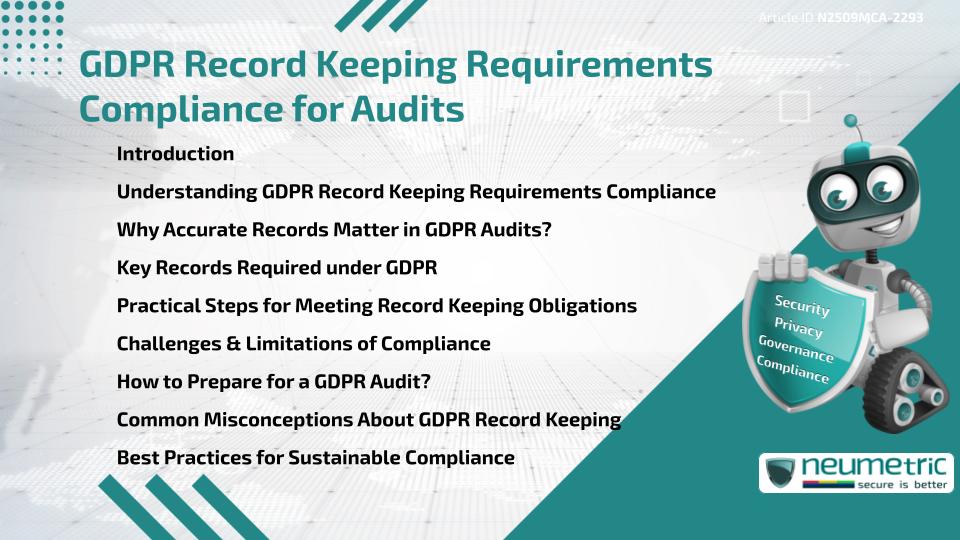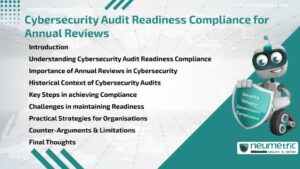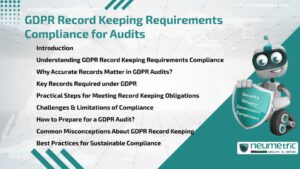Table of Contents
ToggleIntroduction
GDPR record keeping requirements compliance is essential for any organisation handling Personal Data within the European Union. It ensures that businesses not only protect individual rights but also remain Audit-ready at all times. These requirements are laid out in Article 30 of the General Data Protection Regulation & form the foundation for transparency, accountability & lawful processing. Without accurate records, Organisations Risk fines, reputational harm & operational setbacks during audits. This article explains what GDPR record keeping requirements compliance involves, why it matters for audits, the records Organisations must maintain, challenges faced & Best Practices for long-term adherence.
Understanding GDPR Record Keeping Requirements Compliance
At its core, GDPR record keeping requirements compliance involves documenting how Personal Data is collected, processed, shared & stored. The law mandates controllers & processors to maintain written records that detail activities such as data categories, processing purposes, recipients & transfers to third countries. Unlike Privacy Policies aimed at Customers, these internal records serve as Evidence for regulators. They prove that an organisation has considered the full data lifecycle & aligned its operations with GDPR’s principles of fairness, transparency & accountability.
For a deeper understanding of these principles, the official European Commission GDPR overview is a valuable resource.
Why Accurate Records Matter in GDPR Audits?
During audits, authorities do not just look at whether Policies exist-they examine the accuracy & completeness of record keeping. Proper records demonstrate that an organisation can identify data flows, justify processing activities & show compliance with consent, minimization & retention rules. Think of it as the difference between having a fire extinguisher for show versus being able to prove it works. An incomplete or outdated record can raise suspicion, leading to deeper investigations or penalties.
A useful guide on Audit readiness can be found at the Information Commissioner’s Office (ICO) website.
Key Records Required under GDPR
Organisations are expected to maintain detailed records, including:
- Contact details of controllers, processors & Data Protection officers.
- Categories of Personal Data processed.
- Processing purposes, such as Employee management or Customer services.
- Categories of recipients, including Third Party service providers.
- Information on transfers to third countries & safeguards applied.
- Data retention schedules.
- Security Measures used to protect Personal Data.
Smaller Organisations with fewer than two hundred & fifty (250) Employees may have limited obligations, but they are not fully exempt. If processing poses Risks, involves special category data or is not occasional, records must still be kept.
Practical Steps for Meeting Record Keeping Obligations
Compliance can feel overwhelming, but practical steps make it manageable:
- Map all Personal Data processing activities.
- Use centralized tools to log data flows & updates.
- Assign responsibility to a Data Protection officer or compliance team.
- Regularly review & update records to reflect changes in operations.
- Train staff on why accurate documentation is crucial.
A comprehensive checklist from the European Data Protection Board can help Organisations implement these steps effectively.
Challenges & Limitations of Compliance
Achieving GDPR record keeping requirements compliance is not without difficulties. Organisations often face challenges such as fragmented data systems, lack of staff awareness & difficulty tracking Third Party processors. Smaller businesses may see compliance as an administrative burden, while larger firms must manage vast amounts of data across global operations. There are also limitations: records can only reflect what is known & documented, meaning hidden or shadow data flows may escape scrutiny until audits reveal gaps.
How to Prepare for a GDPR Audit?
Preparation goes beyond ticking boxes. Organisations should conduct internal audits, test the accuracy of their records & simulate regulator requests. Keeping documentation accessible, consistent & up to date is key. Think of it like preparing for a Financial Audit: success depends not just on what is in the books, but also on the ability to explain why each entry exists.
Practical advice on preparing for audits is available from CNIL, the French Data Protection Authority.
Common Misconceptions About GDPR Record Keeping
Some Organisations mistakenly believe that only large companies must comply or that outsourcing data processing transfers responsibility. In reality, even Small Businesses & processors have obligations & accountability cannot be outsourced. Another misconception is that keeping Policies on file is enough, when in fact regulators expect living documents that reflect ongoing practices. Clarifying these misunderstandings is essential to avoid unnecessary Risks.
Best Practices for Sustainable Compliance
To sustain GDPR record keeping requirements compliance, Organisations should:
- Automate record updates where possible.
- Integrate compliance into daily operations, not as a one-off project.
- Foster a culture of accountability across all staff levels.
- Regularly benchmark practices against regulatory guidance.
- Maintain open communication with supervisory authorities when needed.
Following these practices makes compliance less about reacting to audits & more about embedding trust & accountability into the organisation’s DNA.
Conclusion
GDPR record keeping requirements compliance is more than an administrative duty. It is the backbone of accountability & the key to surviving audits without costly consequences. By understanding what records are required, addressing challenges & adopting sustainable practices, Organisations can strengthen both legal compliance & Customer Trust.
Takeaways
- Accurate record keeping is legally required & vital for Audit readiness.
- Records must include details on data categories, processing, recipients & safeguards.
- Even small Organisations are obligated under certain conditions.
- Regular reviews & staff training reduce compliance Risks.
- Sustainable practices make compliance a cultural norm rather than a burden.
FAQ
What is the purpose of GDPR record keeping requirements?
The purpose is to ensure Organisations can demonstrate accountability & compliance with GDPR by documenting their data processing activities.
Are Small Businesses exempt from GDPR record keeping requirements?
No, Small Businesses are not fully exempt. They must keep records if processing is regular, risky or involves special categories of data.
How often should GDPR records be updated?
Records should be updated regularly, ideally whenever data processing activities change or at least reviewed annually.
What happens if an organisation fails to maintain proper GDPR records?
Failure to maintain proper records can result in audits, fines, reputational harm & increased scrutiny from regulators.
Who is responsible for maintaining GDPR records?
Both controllers & processors are responsible, with oversight often assigned to a Data Protection officer or compliance team.
Do GDPR records need to be in electronic format?
While GDPR allows both written & electronic formats, electronic tools are often preferred for accuracy, accessibility & updates.
Can GDPR Compliance be outsourced?
Compliance cannot be outsourced completely. Processors may assist, but ultimate accountability rests with the organisation controlling the data.
Need help for Security, Privacy, Governance & VAPT?
Neumetric provides organisations the necessary help to achieve their Cybersecurity, Compliance, Governance, Privacy, Certifications & Pentesting needs.
Organisations & Businesses, specifically those which provide SaaS & AI Solutions in the Fintech, BFSI & other regulated sectors, usually need a Cybersecurity Partner for meeting & maintaining the ongoing Security & Privacy needs & requirements of their Enterprise Clients & Privacy conscious Customers.
SOC 2, ISO 27001, ISO 42001, NIST, HIPAA, HECVAT, EU GDPR are some of the Frameworks that are served by Fusion – a SaaS, multimodular, multitenant, centralised, automated, Cybersecurity & Compliance Management system.
Neumetric also provides Expert Services for technical security which covers VAPT for Web Applications, APIs, iOS & Android Mobile Apps, Security Testing for AWS & other Cloud Environments & Cloud Infrastructure & other similar scopes.
Reach out to us by Email or filling out the Contact Form…





